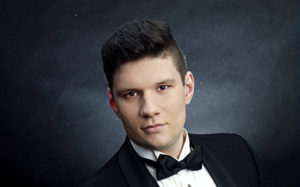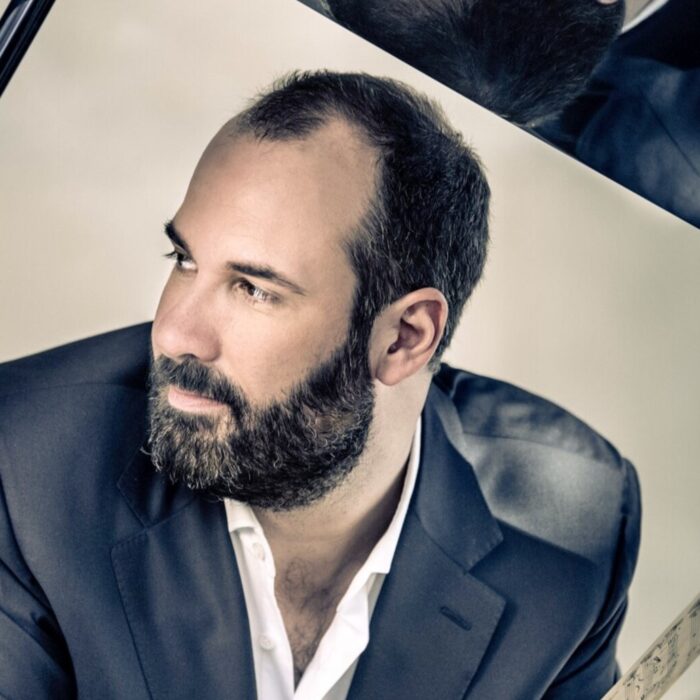
Q & A: Rising Star Jiří Rajniš Speaks About Teatro alla Scala Debut & Growing up in Musical Family
By Francisco SalazarJiří Rajniš belongs to the youngest generation of operatic singers from the Czech Republic. From an early age, the baritone was exposed to music from his parents who were also opera singers. He then went on to study in the U.S. and became a member of the Junges Ensemble at the Semperoper Dresden.
Over the last few years, he has also become a leading performer at The Prague State Opera / National Theatre where he took on numerous leading roles. This season, he is set to make his debut at the Teatro alla Scala earlier than expected in a production of “Salome” before singing the first ever “Rusalka” at the Milan theater. He will also make a debut in Cagliari.
OperaWire spoke with the rising singer on this debut and growing up in a musical family.
OperaWire: How did you know you wanted to be an opera singer?
Jiří Rajniš: I belong to the youngest generation of Czech Opera singers. The last 10 years have passed so quickly and I am already 31-years-old. I started when I was 21 in Germany.
My parents were also opera singers and they started at a small theater where I was born. My father is a baritone and we have sometimes shared the stage together in Janacek and Dvorak works. So I was born into an operatic family. I was always in the theater and always listened to great opera works by Verdi. My father always sang this repertoire while my mother focused on operetta.
And while my parents were like this they did not force me to sing. I did everything that a normal child did but when I studied drama and acting, it was to learn drama and music. I studied acting and drama at the conservatory in Prague. I was involved in a young group of people that were close to cinema and theater.
I then decided to study at UCLA with Vladimir Chernov. He was my icon and I was listening to his recordings for many years. But I only spent two years because we couldn’t pay for it. I then studied with some good coaches from the Metropolitan Opera and I worked in a special coaching program for young singers.
OW: What did you do after your time in the U.S.?
JR: I was offered a place in Juilliard but we couldn’t afford it and I was in an artistic crisis. I wanted to become a great artist and an opera singer. It was a difficult time. I searched for jobs all around Europe for a choir position. I looked in Germany and all over the world.
And then suddenly I was offered a spot at the Sommer Oper Bamberg in 2013. It was very important and it was a young artist program. They offered me the title role of “Don Giovanni” at the age of 21. I became the youngest Czech baritone and opera singer to sing the title role in Germany and on the international stage.
During the performances, there was a German intendant and after the performances, he offered me my first fest contract in Landstheater Coburg. There was a wide repertoire from operetta and opera and it was a very good experience. After four years, I decided to leave and got my management.
I then became a young singer at the Semperoper Dresden and was a major achievement in that I got to share the stage with Angela Gheorghiu, Stephen Costello, Rolando Villazon, and I was conducted by Placido Domingo, and Christian Thielemann.
I got very good roles that I had already done and it was a way to get me more exposure in the industry. A few years later I decided to leave and start my freelance career.
OW: What gave you the impulse to leave the Semperoper Dresden?
JR: There are a lot of opportunities that come and you cannot afford to stay. You have to be independent and take advantage of the opportunities that you are given. Because I started very early on the smaller stages of the Czech Republic, I began singing title roles and became a stable guest of the national theater in Prague.
OW: You have been a member of the Prague National Opera. How do you manage to perform so much in so little time? Do you get to go into so much detail?
JR: In my opinion, it is much easier when you are a freelancer. You can focus more. I don’t take too much work at once. I try to focus on one of two things. Now what happens to me is that I get offered things that I have already done. I was just offered Jacobin by Dvorak and I have done this with my father. I know the work very well.
I was also offered “Don Giovanni.” I know this work. I want to focus on creating great art on stage with truthful acting. I want to convince on stage. I used to do it and I used to do three productions at a time. It was very complicated.
Now as a freelancer, I can choose. I want to do roles that I will use in the future.
OW: This season you have made many debuts. What does it mean to sing at these major theaters like the Teatro alla Scala?
JR: I never expected many things but when the companies started calling, like the Teatro alla Scala and the Wiener Staatsoper, it’s exciting. When I auditioned for La Scala they liked it but they waited to cast me as the Gamekeeper in “Rusalka.” It was to be my Italian debut before Cagliari. But now I will make my debut earlier in a production of “Salome” as the First Nazarene.
But I am still excited about singing “Rusalka” because it is a Czech opera. I will be the only Czech singer in the cast and it will be the first time that the opera is performed at the Teatro alla Scala. I will also become the second Czech baritone to sing at the Teatro alla Scala after Adam Plachetka.
OW: Are there any performances you remember as a child that inspired you?
JR: When I was a young boy, I was obsessed with getting all the recordings from the Met and from La Scala. I had a collection and I was absolutely crazy. I already knew that La Scala was one of the most important houses. I remember seeing a recording of “Ernani” with Plácido Domingo and Mirella Freni from La Scala. And when I finally got to perform at the Semperoper Dresden, I was in heaven. I was getting to perform with the great stars I had watched as a young child. I never expected anything and now after COVID, it’s quite different planning, and things are coming unexpectedly. I wish to be healthy and to keep up with a great level.
OW: Having had parents who were in the business, did they teach you how to sing? Were they your teachers?
JR: My father was my icon and he sang many of the great operas while my mother did many operettas and musicals. So I was just a part of the performances.
My father was my mentor and he brought me many times to his vocal teacher and my father and I became part of the same vocal lesson. With my teacher, he told me that I would learn teh most from learning the hardest arias first. So I was learning music from “Rigoletto” and “Un Ballo in Maschera” when I was super young. He was not afraid to teach me but he also knew that I would not be singing those roles at that age. He was just crazy.
When I grew older, I studied with Vladimir Chernov at UCLA and I am now consulting with Giorgio Zancanaro.
But now my father just gives me advice and continues to be a mentor. But he never taught me.
OW: Having a musical family, did you go to a lot of performances as a young kid?
JR: Oh my god, I would always convince my father to take me to performances. I would always go to his “Trovatore” performances and I would always ask to borrow the costumes. When I went to my grandmother’s home, which was a farm, I would always put on the opera recordings and start singing along to the recordings. I would do theater for my grandmother. I was obsessed and I would make costumes.
OW: What are some roles that you are excited to do in the future?
JR: I have already done some of my favorite roles like Count de Luna and Ford in “Falstaff.” I have done Don Giovanni and Eugene Onegin very often. I have also done Schaunard and Marcello in “La Bohème” but I prefer Schaunard though because it’s a funny role.
In 10 years, I would like to sing more lyric roles like Onegin. Then when I am older I want to do “Rigoletto” and “Nabucco.” I have already got an offer to sing “Nabucco” but it’s too early. I am not interested in Wagner because I do not think I have that voice.
I want to do Bel Canto and I think Rossini’s style fits me. I also want to do more Mozart and later Verdi and Donizetti as well as songs because I love the song repertory.


